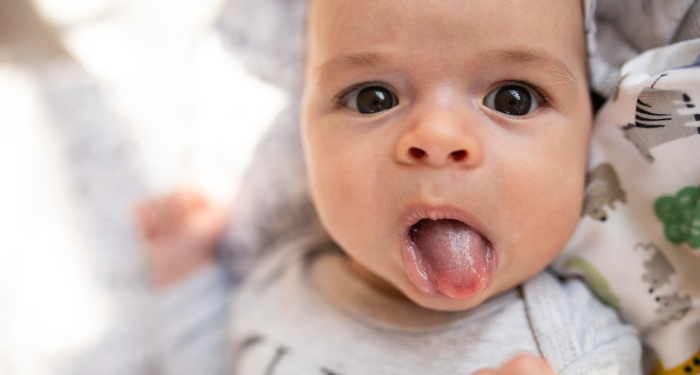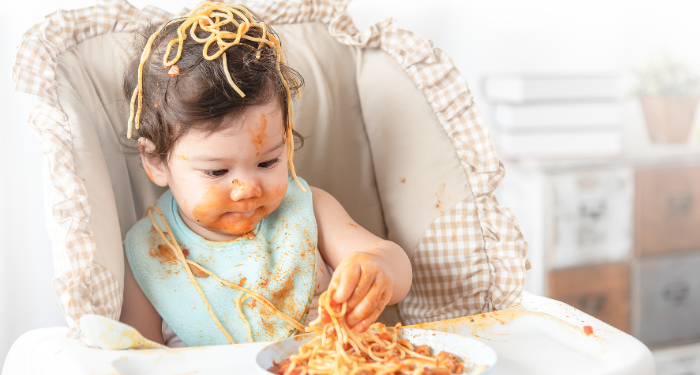
Here we are treading controversial waters yet again but this time on the topic of pacifiers.
I get this question ALL the time. Should we be giving pacifiers? Which kinds are best to optimize oral motor skills?
You can see a past article that dives into the impact of pacifiers on orofacial development here.
Beyond that, there is SO much to take into account. Every baby is different, has different needs and goals therapeutically, therefore, we can not make a blanket statement for everyone. However, we can make general recommendations based on what is best for oral motor development!
A pacifier is a tool that can be used beneficially for infants up to 6 months (some may say upp to 9 months…but keep reading). Oftentimes it is helpful in soothing a newborn. Pacifiers are also used therapeutically these days for suck training.
There are also some studies that suggest using a pacifier with an infant can decrease the chances of SIDS. To those studies, I ask, what was the infants orofacial development like at birth? Was the tongue up on the palate or resting down on the floor of the mouth? Was the mouth open or closed? There is a lot of discussion around this and SIDS. Babies don’t just die “suddenly”… The reality is we shouldn’t *need* a pacifier.
Babies should be born with correct oral rest posture (tongue up on the roof of the mouth, lips closed, nasal breathing). If they are not, we need to figure out the root cause…in other words, why? And how can we help them achieve this (hint: with a pediatric feeding evaluation by an SLP or OT who is also training in tethered oral tissues and myofunctional therapy, but I digress).
So what if your child does seem to need a pacifier? There is no shame in that. We are here to support you in choosing the best one and giving you some guidelines around its use so you can best help your child.
While pacifiers have their benefits, a good rule of thumb is to use it up to 6 months of age and then wean it before it becomes a habit (habits form starting at 6 months). When the tongue is resting on the palate, doing its job, you’ll find a pacifier isn’t needed anymore. For some children a pacifier is never needed as the tongue is resting on the palate at birth so no need to force your child to take one if they don’t want it, spit it out or don’t need it. Pacifiers (just like sippy cups) aren’t a right of passage. It’s okay to skip them!
When we do use pacifiers, some are better than others! Look for pacifiers that have a cylindrical shape. This allows the tongue to have more movement and is better for orofacial development. Pssss… if the package says “orthdontic” it’s usually NOT one we recommend! You can hear more about that here.
Generally speaking, those tend to be the WORST for oral motor development. Here are our top picks
- Philip’s Avent Soothie (with no stuffed animal attached, those are awful for oral development especially once baby is mobile; if you have them already, just remove the stuffy from the paci). These are the “gold standard” when it comes to the shape we want to encourage suck training and correct oral development.
- Sweet Child Soothie Pacifiers are another cylindrical pacifier that passes our standards!
- Ninni Co A bit pricey and doesn’t fit our cylindrical shape but these have become recommended by feeding therapists and lactation consultants as well for the way it helps to promote an optimal sucking pattern
- RaZbaby Jollypop has a cylindrical shape that will allow the tongue to move while sucking
- Nanobebe also has a cylindrical shape making it a good choice
- Topgomes soother pacifier has the cylindrical shape and also has a handle that doubles has a teether when baby begins chewing on teethers
There are more pacifiers out there that qualify under our standards, cylindrical and NO bulb at the end. Remember, the ultimate goal is to get babies tongue resting on the roof of the mouth all the time…this is naturally soothing and calming to them and will help the jaw and face develop properly to accommodate all of their teeth as they grow! But we know babies sometimes need something to help soothe them and we hope this helps you make the right choice for you and your sweet babe.




